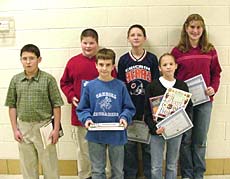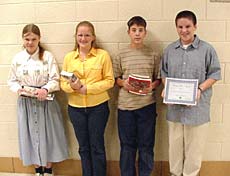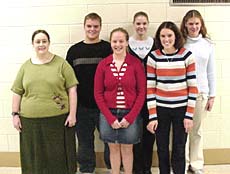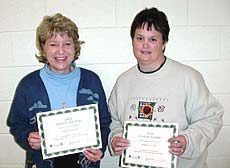|
Features,
Honors
& Awards, Ag
Announcements
Calendar,
Ag News Elsewhere
(fresh daily from the Web)
|
|
Features
|
|
PQA
training offered
[NOV.
14, 2002]
URBANA — The opportunity
to gain free training in order to meet Pork Quality Assurance
standards will be offered next month at three locations by the
University of Illinois Extension in cooperation with the Illinois
Pork Producers Association.
|
|
"More and more packers are requiring
the people they buy pigs from to have PQA certification," explained
Gilbert Hollis, U of I Extension swine specialist. "In order to sell
pigs for slaughter after Jan. 1, 2003, producers are going to need
this certification."
Introduced by the National Pork Board
in 1989, PQA is a three-level management education program. It
focuses on good management practices in the handling and use of
animal health products and encourages producers to review their
approach to their herds’ health programs.

[to top of second column in this
article]
|

The December training, which consists
of a 1½-hour session, prepares producers for PQA certification.
Preregistration is requested. Dates, locations, times and contacts
are:
• Dec. 11: Effingham
Extension Center, 1:30-3 p.m., register by Dec. 9 by contacting Ed
Ballard, U of I Extension animal systems educator based in
Effingham, at (217) 347-5126.
• Dec. 12: U of I
Extension Building, State Fairgrounds, Springfield, 7-8:30 p.m.,
register by Dec. 9 by contacting Hollis at (217) 333-0013.
•
Dec. 17: DeKalb Center for Ag,
Sycamore, 10 a.m.-noon, register by Dec. 13 by contacting Dan
Jennings, U of I Extension animal systems educator based in
Rockford, at (815) 397-7714.
[U of I news release] |
|
 |
|
|
Soybean market signals change
for producers, policymakers
[NOV.
12, 2002]
URBANA — U.S.
policymakers and soybean producers need to wake up to the
implications of dramatic changes in supply fundamentals, said a
University of Illinois Extension agricultural policy specialist.
|
|
"Shifts in crop patterns and production
are common, stimulated by economic signals from both the cost and
demand side. This is the situation today in the soybean market,"
said Robert Hauser. "Producers should take advantage of these
signals to increase profit; legislators should pay attention to them
to improve policies."
Hauser’s article, "The Emperor Has No
Clothes; I’m a Lousy Golfer; and Brazil Has Soybeans," can be found
in the latest Illinois Rural Policy Digest, available online at
http://www.farmdoc.uiuc.edu/
policy/digest/digest.html. [If
you need to download Adobe Acrobat reader for the PDF file,
click
here.]
He believes that a number of factors
are driving toward greater production of corn in the United States
at the expense of soybeans.
"Anyone who even remotely follows the
commodity markets realizes that South America has changed the supply
fundamentals in a dramatic way over the past 10 years," he
explained. "We need to focus on some of the economic and policy
implications of this increase in long-run production capacity."
Between 1970 and 2001, world soybean
yield rose by 50 percent, but at the same time soybean production
tripled, increasing by 260 percent. And, he noted, the 260 percent
increase may be too small, considering that most 2003 production
projections for South America are now around 80 million metric tons,
compared with the three-year average of 65 million metric tons used
in the calculations.
Propelling this dramatic rise in South
American soybean production are a number of factors.
"Soybean varieties have been developed
that do well in Brazil’s subtropical and tropical climates and
soils," he explained. "Soil fertility has been increased
successfully. No-till technology allows maintenance of this
fertility in areas where it is quickly lost when the soil is turned
over and exposed to sunlight.
"The opportunity cost of land in much
of South America is very low. And, finally, economic conditions and
inflation have stabilized over the past eight years. These factors
not only have made it possible for South America, particularly
Brazil, to engage in soybean production in a big way, but there are
strong signs that the expansion is far from over."
After comparing a number of costs,
Hauser concluded that parts of South America have a comparative
advantage in growing soybeans over the United States.
[to top of second column in this
article]
|
"This idea is not well received by many
groups in the United States. But instead of denying this
possibility, let’s consider some of the ramifications," he said.
Current market prices are signaling
U.S. farmers to move to a crop in which they enjoy a comparative
advantage — corn. "Without the soybean loan rate program, this
signal would be much stronger," he said.
Hauser said that this does not mean
U.S. producers will quit growing soybeans entirely. Both domestic
needs and a significant share of the export market will continue to
support U.S. soybean production.
"But producers will increasingly
consider two-year or three-year continuous corn rotations that will
shift aggregate U.S. supply away from soybeans," he said.
Market prices in recent months have
reinforced his contention that we are in a new era, said Hauser.
"In August, low yield expectations
caused the most bullish U.S. production and carry-out conditions
since the mid-1990s, yet the price of soybeans stayed below $6. Not
long ago, it was reasonable for producers to expect at least $6
soybeans during ‘normal’ years," he said. "This is now not normal.
But this fact is neither good nor bad, unless we ignore it."
Hauser believes that the fundamental
supply and demand situation in the world soybean market points to
continuing low soybean prices, due to increased South American
production and the need for comparative advantage adjustments.
While the United States might have an
absolute advantage (lower production and transportation costs) in
growing soybeans, its opportunity cost (say, growing 140-bushel
corn) is usually much higher than in Brazil, where average yields
for non-soybean crops are lower.
Hauser believes that in terms of
comparative advantage, U.S. soybean producers are like the
fast-typing business executive who nevertheless employs a typist,
even though he types slower than the executive. The motivation is to
free the executive to do other, more productive things.
"In the case
of soybeans, U.S. producers may find themselves in the same
situation as the executive, letting South America grow the soybeans
because of greater incentives in the United States to produce corn,"
said Hauser.
[U of I news release] |
|
|
4-H report
[NOV.
12, 2002]
Recent and upcoming 4-H
events were topics of discussion at the Oct. 28 meeting of the 4-H
Federation. Leaders Gene Dennis and Amy Hyde and 11 members met at
the Extension office.
|
|
The group discussed rescheduling
lock-in and movie night. Movie night was set for Nov. 10, and the
lock-in will be Jan. 19.
Emily Bakken and Andrew Fulton
volunteered to carry the flag for Achievement Night, Nov. 7.
|
Duane Gieseke and Amanda Davidson
volunteered to help with a centennial table.
The group
also talked about the wiener roast on Oct. 5, the "Find Out
Party" on Oct. 26 and officer training night, which will be Nov. 19.
[Elyse Berger, reporter] |
|
|
 Beef
cow nutrition workshop Beef
cow nutrition workshop
[NOV.
11, 2002]
Cow-calf producers can
obtain feed analysis on their feedstuffs by contacting the Logan
County Extension office. Forage sample bags and mailing envelopes
are available for sending the forage samples to a forage lab for
analysis. There is a small charge from the laboratory for the forage
analysis, and a Penn State forage probe will be available to take
core samples for mailing to a forage testing lab.
|
|
A two-hour workshop will cover the
nutritional needs of the cow and the effect of body condition
scoring and environmental conditions on reproduction and production.
In addition, individual producers can have their rations balanced on
the new "Balancer 2000 Computer Program," using the analysis of
their individual feedstuffs. These individual sessions will be on an
appointment basis and must be made through the Extension office.
Dave Seibert, animal systems educator from the East Peoria office,
will conduct the educational program and computer ration
formulation. Participants should also complete an information
worksheet for the Balancer 2000 program to get the most of the
workshop.
Preregistration is needed; call
732-8289 by Dec. 12.
Fall-applied herbicides roundtable
George Czapar, Extension educator, will
be leading a roundtable discussion concerning fall-applied
herbicides for control of winter annuals and how it fits into your
traditional herbicide program. Data from university research will be
presented, along with an opportunity to share experiences and get
answers to questions. Reservations are requested; call 732-8289 by
Nov. 18.
[to top of second column in
this article]
|
Private pesticide training and testing
2003 will be a big year concerning the
number of private pesticide applicators due to be recertified.
Certification is needed to purchase and apply restricted-use
pesticides on ground you own or operate. This license is not for
applicators applying pesticides for hire, on public grounds or
church grounds. Those areas require commercial licenses.
Two sessions have been scheduled for
the testing season. Enrollment is limited at each session, and
reservations may be made by calling the office, 732-8289. Training
will begin at 8:30 a.m. at each session, and the testing will begin
following the training session.
Session 1: Dec. 4, at the
Extension office; training begins at 8:30 a.m.
Session 2:
Feb. 20, 2003, at the Extension office; training begins at 8:30 a.m.
[John
Fulton]
|
|
|
Grazing pasture walks
announced
[NOV.
9, 2002]
URBANA — Central Illinois
livestock producers will have four opportunities this month to see
how others are extending the grazing season to reduce feed cost and
to stretch seed supplies in a series of pasture walks sponsored by
University of Illinois Extension.
|
|
"These pasture walks have been planned
to view beef cattle grazing winter annual cereal crops of rye, wheat
and oats along with the brassicas of turnips," said Dave Seibert, U
of I Extension animal systems educator based in East Peoria. "In
addition, stockpiled fescue will be viewed at some of the
operations."
The dates and locations are:
• Nov. 12, 9-11 a.m., Mike
and Troy Kitley farm in Clay County.
• Nov. 14, 9-11 a.m.,
Bruce Betzold farm, Montgomery County.
• Nov. 21, 9:30-11:30
a.m., Southside Stock Farm, Greene County.
• Nov. 21, 1:30-3:30 p.m.,
Paul and Jason Smith farm, Macoupin County.
[to top of second column in this
article]
|
"The beef cattle producers from all
four locations will share their experience with fellow producers on
what has and has not worked this year with winter annuals and for
fall and winter grazing," said Seibert.
For more
information on the Kitley and Betzold pasture walks, contact Ed
Ballard, U of I Extension animal systems educator based in
Effingham, at (217) 347-5126. For the Smith and Southside Stock farm
pasture walks, contact Seibert at (309) 694-7501. Preregistration is
not required for any of the locations.
[U of I news release] |
|
|
2002 Illinois Sheep
Industry Day set
Coffee will be served as sheep are counted
|
|
[NOV.
9, 2002]
URBANA — A number of
issues of interest to Illinois sheep producers, including grazing,
value-added wool and changes in the state’s scrapie control program,
will be on the agenda Dec. 7 at the 2002 Illinois Sheep Industry
Day. The event will be in Room 150 of the University of Illinois
Animal Sciences Laboratory.
The event is co-sponsored by U of I
Extension, the Department of Animal Sciences, and the Illinois Lamb
and Wool Producers. The latter organization will have its annual
meeting at the conclusion of the Sheep Industry Day program.
The event begins at 9 a.m. and
continues until 3 p.m., at which time the Illinois Lamb and Wool
Producers will \meet.
|
Neal Merchen, acting head of the
Department of Animal Sciences, will speak on the future of the U of
I sheep facilities and programs. Rick Jones, designated
epidemiologist for Illinois, will discuss changes in the state’s
scrapie program. Dean Oswald, U of I Extension animal systems
educator based in Macomb, will provide an update on the value-added
wool program. Richard Cobb will introduce Extension’s sheep grazing
TeleNet series, and Jay Solomon, an Extension educator in
engineering technology based in East Peoria, will discuss the
mechanics of grazing.
Cobb will also make a presentation on
developing methods and strategies to handle sheep more easily and
safely.
There is a
$10 per person registration fee, which includes lunch. Those
interested in registering, which must be completed by Nov. 29,
should contact Cobb at (217) 333-7351 or by e-mail to
arcobb@uiuc.edu.
[U of I news release] |
|
|
Honors
& Awards
|
|
Logan County 4-H
Achievement Night
[NOV.
13, 2002]
Logan County had its
annual 4-H Achievement Night on Nov. 7 at the Lincoln Park District
Rec Center. Approximately 115 4-H members, leaders and families came
to congratulate the award recipients.
|
|
The top award-winners
in the major award categories on Nov. 7 include the following:
• Three of our Logan County 4-H members have been
selected to receive the highest honor in a 4-H’ers career. Because
of their outstanding 4-H career and their excellent job with their
4-H records, these individuals have been selected as Illinois
delegates to the 2002 National 4-H Congress in Atlanta, Ga., later
this month! Delegates and their categories are:
Hans Bishop — Mechanics and Technology
Amanda Davison — Foods, Nutrition, and Health
Abrigail Sasse — Animal Sciences
• The top 10 percent of records in a project area in
the state are given a National 4-H Congress Blue Award Certificate
each year. Certificate recipient is:
Emily Bakken — Foods, Nutrition, and Health
• The "I Dare You" award is presented to 4-H’ers who
have demonstrated qualities of leadership, excellence in character
and effective future leadership. This year’s winners are:
Elizabeth Brooks, Lincoln
Clint Garey, Atlanta
Ashley Lamb, Latham
Nicole Tripplett, Middletown
• The 4-H Key award is the highest award given. The
qualifications are these: 16 years of age, minimum of three years of
4-H membership, submit a 4-H story and meet nine other requirements
as verified by their leaders. This year’s winners are:
Emily Bakken, Lincoln
Hans Bishop, Atlanta
Elizabeth Brooks, Lincoln
Amanda Davison, Beason
Kyle Janssen, Middletown
• Some 4-H’ers are chosen each year in special award
categories. A book is presented to a 4-H’er with outstanding work,
quantity, quality, years, citizenship, leadership, participation,
skill acquisition and growth. The books are given in three age
categories: 8-11 years of age, 12-14 and 15-19. A Blue Award is
given to a 4-H’er deserving of repeat recognition in a category. In
the 15-19 age category, the medal awards are nationally sponsored
and may be received only once in each curriculum area.

[Photos provided by Amy Hyde, 4-H Youth Development]
[8- to 11-year-old award recipients:
(front from left) Matthew Runyon, Zach Huffer and Nichole Benz;
(back from left) David Fulton, Ben Buse and Jenna Opperman.]
Outstanding Awards
Achievement
8-11 years old — Zack
Huffer, Lincoln, book; Jenna Opperman, Lincoln, Blue Award
12-14 — Marty
Oltmanns, Lincoln, book; Andrew Fulton, Lincoln, Blue Award
15-19 — Mary Healy,
Middletown, medal; Abrigail Sasse, Beason, medal; Kyle Janssen,
Middletown, medal; Amanda Davison, Beason, book; Emily Bakken,
Lincoln, Blue Award; Amanda Davison, Beason, Blue Award
Animal Science
8-11 — David Fulton,
Lincoln, book; Shelden Tibbs, Middletown, Blue Award
12-14 — Kim Turner,
Atlanta, book; Andrew Fulton, Lincoln, Blue Award
15-19 — Elizabeth
Brooks, Lincoln, medal; Emily Bakken, Lincoln, book; Abrigail Sasse,
Beason, Blue Award; Emily Bakken, Lincoln, Blue Award; Amanda
Davison, Beason, Blue Award
Environment/Natural Resources
8-11 — Mathew Runyon,
Lincoln, book; Ben Buse, Lincoln, Blue Award; Zack Huffer, Lincoln,
Blue Award
12-14 — Chris
Ackerman, Lincoln, book
15-19 — Hans Bishop,
Atlanta, medal; Hans Bishop, Atlanta, book; Kyle Janssen,
Middletown, Blue Award

[12- to 14-year-old award recipients:
(from left) Elizabeth Carter, Kim Turner, Marty Oltmanns and Andrew
Fulton.]
Food, Nutrition and Health
8-11 — Nichole Benz,
Lincoln, book; Jenna Opperman, Lincoln, Blue Award
12-14 — Elizabeth
Carter, Lincoln, book; Chris Ackerman, Lincoln, Blue Award
15-19 — Krista
Ubbenga, Hartsburg, medal; Elizabeth Brooks, Lincoln, medal; Emily
Bakken, Lincoln, book; Emily Bakken, Lincoln, Blue Award, Amanda
Davison, Beason, Blue Award
[to top of second column in this
article]
|
Home and Family
8-11 — Kristin
Bishop, Atlanta, book; Nichole Benz, Lincoln, Blue Award
12-14 — Elizabeth
Carter, Lincoln, book; Katelyn Beavers, Lincoln, Blue Award
15-19 — Abrigail
Sasse, Beason, medal; Leila Ballinger, Atlanta, medal; Leila
Ballinger, Atlanta, book; Amanda Davison, Beason, Blue Award; Emily
Bakken, Lincoln, Blue Award
Leadership
12-14 — Andrew
Fulton, Lincoln, Blue Award
15-19 — Emily Bakken,
Lincoln, medal; Amanda Davison, Beason, book; Kyle Janssen,
Middletown, Blue Award

[15- to 19-year-old award recipients:
(front from left) Mary Healy, Amanda Davison and Emily Bakken; (back
from left) Kyle Janssen, Audra Ballinger and Leila Ballinger.]
Mechanics and Technology
8-11 — Mathew Runyon,
Broadwell, book; Zack Huffer, Lincoln, Blue Award
12-14 — Marty
Oltmanns, Lincoln, book; Andrew Fulton, Lincoln, Blue Award
15-19 — Hans Bishop,
Atlanta, Blue Award
Personal Development
8-11 — Nichole Benz,
Lincoln, book
12-14 — Chris
Ackerman, Lincoln, book; Andrew Fulton, Lincoln, Blue Award
15-19 — Susanna
Cluver, Latham, medal; Krista Ubbenga, Hartsburg, book; Emily Bakken,
Lincoln, Blue Award; Leila Ballinger, Atlanta, Blue Award; Krista
Ubbenga, Hartsburg, Blue Award; Amanda Davison, Beason, Blue Award
Plant and Soil Science
8-11 — Kristin
Bishop, Atlanta, book
12-14 — Marty
Oltmanns, Lincoln, book; Scott Ubbenga, Hartsburg, Blue Award
15-19 — Audra
Ballinger, Atlanta, medal; Kyle Janssen, Middletown, medal; Emily
Bakken, Lincoln, book; Mary Healy, Middletown, Blue Award; Hans
Bishop, Atlanta, Blue Awards; Emily Bakken, Lincoln, Blue Award

[Club of the Year awards: Leaders:
Sherry Fulton (left) of Chester 4-H and Mary Jo Janssen of
Middletown 4-H.]
Club Awards
Club – Agriculture —
The Pioneers
Club Community
Involvement and Global Awareness — Middletown 4-H’ers
Club Standards of
Excellence — Atlanta Ag, Atlanta Town & Country, Beason Ag
Chester 4-H, Clover
Kids, Middletown 4-H’ers, Millennium Clovers, The Pioneers
Clubs of the Year —
Chester 4-H, Middletown 4-H’ers
Top Food Awards
Junior foods winner —
Nichole Benz, Lincoln
Senior foods winner —
Elizabeth Brooks, Lincoln
Herdsman of the Year
Daniel Fulton
Leaders recognized
Thirteen adult
volunteers were recognized and honored at the Logan County 4-H
Achievement Night. They were honored in the following categories:
First-year leaders —
Denice Hildebrandt, Lincoln; Rebecca Rich, Emden
Fifth-year leaders —
Kim Beavers, Lincoln; Lori Cross, Hartsburg; Brent Hellman, Emden;
Gail Parson, Lincoln; Mark Rogers, Emden
Tenth-year leaders —
Martha Green, Atlanta; Wesley Green, Atlanta; Teresa Hoerbert,
Delavan; Donna Struebing, Hartsburg; Janet Turner, Atlanta
Twentieth-year leader
— Deanna Voyles, Lincoln
Congratulations!
For a complete listing of the 4-H awards
presented on Nov. 7 or for information on the Logan County 4-H
program, please contact the Logan County 4-H office at 980 N.
Postville Drive, Lincoln, IL 62656, or call (217) 732-8289.
[Logan
County Extension news release
by Amy Hyde] |
|
|
Ag
Announcements
|
|
Olympia FFA Alumni news
[NOV.
8, 2002]
What do a tree, a chain saw
and a TV have in common? The Olympia FFA Alumni chapter is selling
raffle tickets for these items. The low-priced tickets provide a
chance at a 36-inch Zenith color TV, a Stihl Farm Boss chain saw and
a 1.5- to 3-inch diameter sunset red maple tree.
|
|
The chapter draws in members from
McLean, Tazewell, Woodford, DeWitt and Logan counties.
Proceeds from the raffle will help
support the agriculture program of the Olympia School District.
The drawing for the items will be Jan.
11, 2003, which is the tentative date for the FFA alumni banquet.
|
For more
information on purchasing a raffle ticket or about the FFA Alumni
chapter, contact any member of the chapter or call (309) 379-5911.
[News
release] |
|
|
|